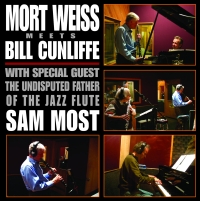Home » Jazz Articles » Album Review » Sanda: Gypsy in a Tree
Sanda: Gypsy in a Tree
Sanda, as she is known professionally, sings these songs with passion and respect. The songs tell stories of love, anger, lost youth and old age, and she brings each one to life with a striking intensity and passion. These are songs with universal themes, and Sanda inhabits them so completely that their impact easily transcends geographical or cultural distances. Her delivery is reminiscent of England's Norma Waterson or Ireland's Margaret Barry—a reminder of the way in which European musics have interacted over the centuries. These are not Sanda's songs, or her stories, but she lives every one as if it were, giving voice to the protagonists with honesty.
The musicians on Gypsy In A Tree are superb, and their instrumental backing is in complete sympathy with the moods and emotions of the songs, readily heightening the impact of Sanda's voice. This is only to be expected, were these players heavily steeped in the Roma tradition, but they are not. The core trio is of New York-based Japanese musicians, who bring elements of jazz, R&B and blues to the mix. There's also a distinct tinge of Berthold Brecht's theatricality, due, perhaps, to Sanda's own background in theatre, and to her being the niece of Brecht's wife, Helene Weigel.
Shoko Nagai's accordion and Doug Wieselman's clarinet are, perhaps, the most authentically East European of the instruments in terms of their sound, Nagai skipping brightly across tunes like "Saraiman," while Wieselman is particularly effective on the jaunty "Un Tigan Avea O Casa." It's the rhythm section, of brothers Stomu Takeishi and Satoshi Takeishi, that lends the music a more contemporary aspect, however. Their incisive playing adds drive and depth, and does much to accentuate these songs' emotions, Stomu's mournful bass building the sadness of "Adu Calu' Sa Ma Duc" ("Bring Me My Horse It's Time To Go"), just as his loping, thick-toned, playing combines with Ben Stapp's tuba to underpin the happier groove of "Nu Exista-N Lumea Asta" ("There Is No One Like My Brother").
Sanda has been resident in New York for twenty years. Born in Romania, she first heard many of these songs from the Roma people themselves. Her love for the tunes, and the sad and often strange stories told by their lyrics, has remained with her, making Gypsy In A Tree is a genuinely evocative and intensely lovely record.
Track Listing
Intr-o zi la poarta mea; Sun tigan avea o casa; As ofta sa-mi iasa focul; Saraiman; Adu calul sa ma duc; Anii mei si tineretea; Jandarmul; Nu exista-n lumea asta; Toderel; Dans; Alomalo.
Personnel
Sanda Weigl: vocals; Douglas Wieselman :guitar, clarinet; Shoko Nagai: accordion, piano, Farfisa; Ben Stapp: tuba; Stomu Takeishi: electric bass; Satoshi Takeishi: percussion.
Album information
Title: Gypsy in a Tree | Year Released: 2011 | Record Label: Barbes Records
Tags
PREVIOUS / NEXT
Support All About Jazz
 All About Jazz has been a pillar of jazz since 1995, championing it as an art form and, more importantly, supporting the musicians who make it. Our enduring commitment has made "AAJ" one of the most culturally important websites of its kind, read by hundreds of thousands of fans, musicians and industry figures every month.
All About Jazz has been a pillar of jazz since 1995, championing it as an art form and, more importantly, supporting the musicians who make it. Our enduring commitment has made "AAJ" one of the most culturally important websites of its kind, read by hundreds of thousands of fans, musicians and industry figures every month.




















